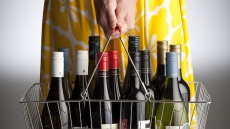TORONTO — Canada's rising detention of non-criminal foreigners in maximum-security prisons amounts to arbitrary, cruel and inhumane treatment that violates international obligations, a disturbing new report concludes.
The report by the University of Toronto's International Human Rights Program finds that Canada Border Services Agency has become more heavy handed in dealing with migrants with little or no accountability.
Renu Mandhane, a criminal lawyer and the program's executive director, said the report reveals "shocking gaps" in the rule of law.
"A CBSA officer essentially has the discretion to determine that somebody should be held in maximum-security jail conditions," Mandhane said Wednesday in an interview.
"It was really surprising to me...that decision was totally discretionary and also not subject to any rules."
The report, called "We Have No Rights", concludes incarceration can have a catastrophic impact on migrants' mental health. It contains harrowing profiles of detainees imprisoned for as long as eight years who talk of a lack of access to support services, confinement in cold windowless cells, their despair.
"They treat us like garbage," one inmate told researchers. "We had no rights at all."
Figures show Canada detained more than 7,300 migrants at a cost of more than $50 million in 2013. About one third were incarcerated in jails, even though few might be considered criminals. A Red Cross report found more than 2,000 foreigners in Ontario jails in 2012.
Reg Williams, a director of CBSA immigration enforcement from 2004 until 2012, said the agency has become increasingly "paramilitaristic" with an emphasis on force rather than co-operation.
Detainees have become little more than a file that no one wants to open, leading to detentions that have become "more akin to storage," he said.
"The dramatic plunge in removals accompanied by a disproportionate rise in detention since 2012 are huge red flags pointing to a detentions program that is out of control," Williams said in an interview.
The report for the law faculty's rights program by students Hanna Gros and Paloma van Groll notes the especially troubling problem of jailing migrants with mental-health issues.
In every case, they say, detention in a provincial jail, even for a short period, exacerbated mental-health issues or created new ones.
An agency spokesman said "it is not the practice of the CBSA to comment on third party documents."
The report makes several recommendations, foremost is one that calls for the creation of an independent body or ombudsman to oversee and investigate the border services agency and to whom immigration detainees can complain.
It also urges alternatives to detention and, in keeping with practices in the United States and Europe, creating a presumption against jailing that lasts beyond 90 days with court oversight for longer stretches.
In a foreword, Prof. James Hathaway of the University of Michigan Law School says what happens in Canada goes much further than protecting the public.
"Beyond its truly massive scale, the study shows that migrant incarceration by Canada often operates in something approaching a legal 'black hole'," Hathaway says.
Several coroners inquests into migrant detainees who have killed themselves or died of medical-related causes as well as the Canadian Red Cross have criticized CBSA's punitive approach over the years.
Syed Hussan, with the activist End Immigration Detention Network, said jailing non-criminal migrants must stop.
"For those suffering with prior histories of trauma, immigration detention can be deadly," Hussan said.
"Separation from families, no comprehensive judicial review process, and lack of adequate services in the prison means that detention causes severe stress, depression and degradation of health."
The International Human Rights Program plans to present its report to the UN Human Rights Committee in Geneva next month.
QuickFacts on report into CBSA migrant jailings in Canada
Key Findings:
• Even short-term immigration detention has a significant negative impact on mental health;
• Detention causes psychological illness, trauma, depression, anxiety and aggression;
• Indefinite detention is one of the most stressful aspects of immigration detention;
• Detention can be particularly damaging to refugees, victims of torture or the mentally ill.
Key Recommendations:
• Create an independent body/ombudsman to oversee and investigate the CBSA;
• Enshrine in law the use of least restrictive measures against migrants;
• Detention beyond 90 days should be unusual and subject to court oversight;
• Take into account mental health and other vulnerabilities in detention reviews;
• Detain migrants in dedicated, minimum-security facilities near community supports and their lawyers.
SOURCE: "We Have No Rights," University of Toronto International Human Rights Program





